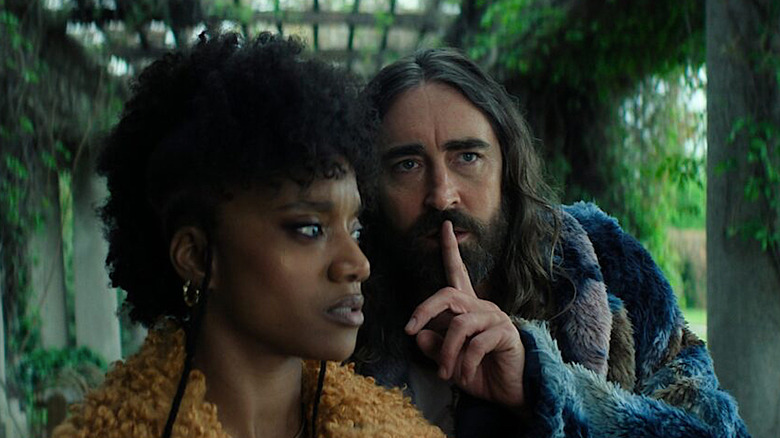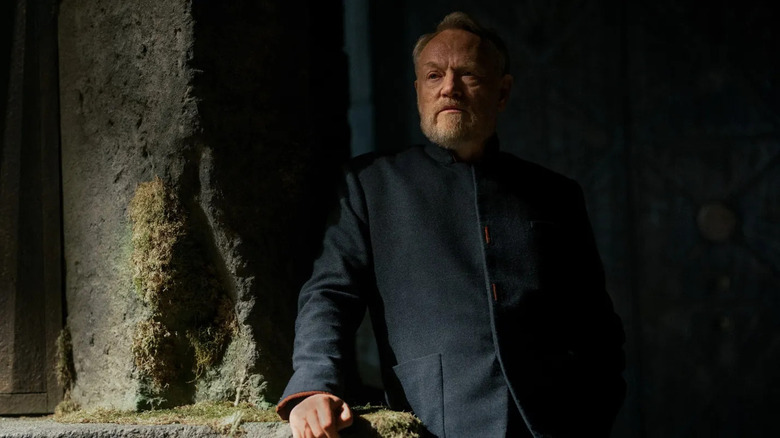Foundation's Showrunner Sold Apple On The Isaac Asimov Adaptation With A Single Sentence
We may receive a commission on purchases made from links.
Apple TV's "Foundation" series hit a new gear in season 3. Even with showrunner David S. Goyer gone, the upcoming season 4 will be exciting as the stories of the First and Second Foundations officially pull away from the smouldering ruins of the leaderless Galactic Empire and begin to chart their own destiny in a much wider galaxy. It's wild to think, three seasons in, that this show started with a single sentence pitch. And yet, according to Goyer, that's what happened (though it's a bit of a tongue-in-cheek comment, to be fair). Here's how the mastermind behind the brilliant bit of sci-fi explained the genesis of the show in an interview with The Hollywood Reporter:
"Apple asked me if I could pitch it in one sentence [...] They sort of asked it laughingly."
Here was his response:
"It's a 1,000-year chess game between Hari Seldon and the Empire, and all the characters in between are the pawns, but some of the pawns over the course of this saga end up becoming kings and queens."
Yep. That pretty much sums the whole thing up. Sure, there are some important additional details in there, like the mathematical prediction of mass human behavior through psychohistory and the Jedi-like power of mentalics, but by and large, the whole story is one giant chess game. Easy pitch. The problem that faced Goyer (and countless others before him who thought about adapting this classic sci-fi story) was the execution.
The challenge of adapting Foundation
"Foundation" looks fun as a completed adaptation, but the truth is, Goyer and his team had to work some extraordinary magic behind the scenes to get this thing to come together. The challenge comes from the way Asimov created his seven Foundation books (five main books and two prequels).
The first three books feature massive time jumps meant to skip through a 1,000-year period of human history, 20,000 years in the future (the author ended up getting through about half of that time in the series). Further complications arise from the anthological nature of those first three books. Characters are constantly changing, and it isn't until books four and five that we settle into a consistent cast. Yet another challenge is the lack of character depth. Goyer touched on this (again via THR), saying:
"They're not particularly emotional; they're books about ideas, about concepts. So a lot of the action happens off-screen. In the books, the Empire, which is on 10,000 worlds, literally falls off-screen — like, it happens in between chapters. Obviously, that wasn't going to work for a television show."
As an avid reader who has devoured the entire book series more than once, I remember thinking the same thing. The lack of character depth and consistency made the whole thing hard to imagine translating smoothly to the silver screen. Goyer's solution was brilliant:
"I figured out a way to have some of the characters extend their lifespans. About six characters will continue from season to season, from century to century. That way it becomes a half anthological, half continuing story."
Does this tamper with Asimov's original storytelling formula? Sure. But no one can argue with the results. "Foundation" is a certified hit that, so far, has gotten better with each season.
Asimov's original pitch for Foundation was equally interesting
I can't end without at least touching on Isaac Asimov's own journey to start the "Foundation" stories. The author recounted the famous story more than once. Each time, two things stand out. First, as a young 21-year-old fledgling writer, he couldn't think of a pitch for his publisher. Second, he turned to the historic and epic decline and fall of the Roman Empire as inspiration. Here's how Asimov put it in his autobiography, "In Memory Yet Green":
On August 1, 1941, I took the subway to [John W.] Campbell's office after class was over. On the way down I racked my brain for a story idea. Failing, I tried a device I sometimes used. I opened a book at random and then tried free association, beginning with whatever I first saw. The book I had with me was a collection of Gilbert and Sullivan plays. I opened it to Iolanthe–to the picture of the Fairy Queen throwing herself at the feet of Private Willis, the sentry. Thinking of sentries, I thought of soldiers, of military empires, of the Roman Empire–of the Galactic Empire–aha!
Turning to the past to build the future. Genius. Remember, Asimov was one of just a few authors setting the tone for the century of science fiction to follow. To think, the future of the entire genre came down to an uninspired young writer on a train turning to the classics as he tried to meet a deadline. And then, decades later, an inspired showrunner simplified those stories into a single-sentence pitch to create one of the best TV shows of 2025. That's drama on a near-galactic level. You just can't make this stuff up.


